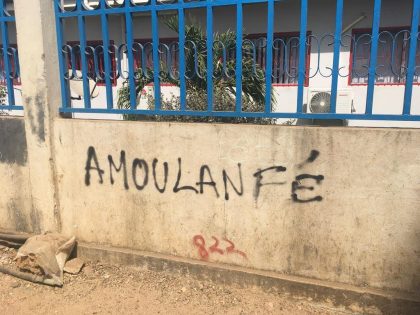
The phenomenological real
A book by writer Melissa Thackway and director Jean-Marie Teno highlights an ethical and politically engaged partnership between filmmaker and film critic.
89 Search Result(s) for: “Sankara ”

A book by writer Melissa Thackway and director Jean-Marie Teno highlights an ethical and politically engaged partnership between filmmaker and film critic.

For the peripheries and proletarians of the world—most of the world—Maradona is a symbol of defiance against the football aristocracy, corporate bosses and empire itself.

On our annual publishing break, we ask: if the opposite of “weird” is normal, what if normal is equally problematic?

This week’s AIAC Talk is devoted to the life, thought, and legacy of Amílcar Cabral. Watch on Youtube, Facebook, or Twitter, and subscribe to our Patreon for the archive.

What’s fueling the military takeovers sweeping across West and Central Africa?

Prince Louis Rwagasore, also known as “Burundi’s Lumumba," has been reduced to a political tool by the country's elite, but artists are doing his legacy justice.

For France's former colonies in Africa to enjoy true independence, they need to control over their own money and budgets.

A project - helmed by historians Benjamin Talton and Jean Allman - to archive post-independence African revolutions, including Kwame Nkrumah's personal and professional papers.

Contemporary approaches to the legacy of colonialism tend to narrowly emphasize political agency as the solution to Africa’s problems. But agency is configured through historically particular relations of which we are not sole authors.

Music’s ingratiating moral mask has withered, revealing a disfigured face whose true ethical philosophy is, as Lauryn Hill once noted, “paper thin.”

Fashion creates spectacle. What can we learn from the images from Guinea's recent coup d’état?

The Malcolm X effect of Gambian-British activist Momodou Taal.

This week, AIAC talks with Dr. Lassane Ouedraogo on what's behind the coup in Burkina Faso.

The radical politics of the professional middle classes—too often found full of rhetoric, but short on action—are explored in Leo Zeilig’s new novel, The World Turned Upside Down.

No matter where they are, the children of African heads-of-state live lives comically far-removed from those of the average citizen in their home countries.

The documentary, Rumba Kings, offers a commendable and tireless argument for both an intangible cultural heritage case and a centering of the Congolese way.

On the other side of the pandemic, we must strengthen and build strong working-class movements to challenge imperialism and neocolonialism.

I'm still waiting for that entrepreneur who'll start a Netflix for African films. I'll be a customer.
…played ‘Always Shine’ with Lupe Fiasco and Bilal on Letterman this week: http://www.youtube.com/watch?v=FIXKbUCC-bU Elom 20ce channeling

What is it with the long practice in British racing of adding an African appellation to a race horse's name. Most African countries now have at least one horse name after it.